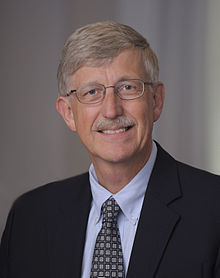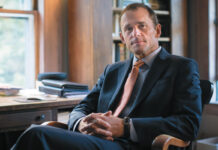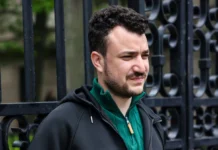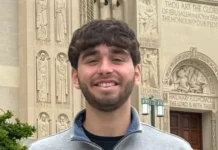
The University welcomed Dr. Francis Collins to Grounds on Tuesday for a lecture titled “Science, Diversity, and All Of Us.” The speech was part of UVa Engineering’s Excellence Through Diversity Distinguished Learning Series.
Collins currently serves as the director of the National Institutes of Health (NIH) but, in addition to overseeing the work of the largest supporter of biomedical research in the world, he is also an alumnus of the University and a recipient of the Presidential Medal of Freedom.
The physician-geneticist told the audience at Old Cabell Hall that he was delighted to return to a university “filled with light, and truth, and love,” though he acknowledged how far he had come since his days as a student.
Joking that he was quite the “geek” as an undergraduate, Collins recalled arriving at UVa as a student at the young age of 16. At that time, he had no inkling that he would return to speak as one of its most distinguished alumni more than 50 years later, right on the heels of its bicentennial celebration. Collins is a landmark researcher of the human genome, and has pioneered scientific research of disease genetics.
Collins focused his talk on people’s propensity to identify “otherness” in different human features, even though the vast majority of all human genes are identical. While some see disparate qualities as negative, Collins holds the opposite view.
“When we look at the diversity of the world, we should look at it as a wonderful opportunity to look at the differences,” he said.
While those differences in genetics undeniably exist, he explained, they by no means justify discrimination against underrepresented groups.
“Let no one think that they will find evidence in genomic science that will support a prejudiced view of humanity,” he said. Collins highlighted the need to encourage women and non-white citizens to pursue careers in science, and pointed out the unique challenges posed when doing so. He explained that, for one, diverse potential candidates are often discouraged from entering the field when few role models exist for underrepresented groups in science.
“If you don’t have a natural mentor or network…it is much harder to get through rough spots in the training,” Collins said.
“There are a lot of people who are interested in science, and particularly in life science, throughout their K-12 education,” he continued. While this is promising, Collins pointed out that many aspiring students lack the resources to cultivate their passion once they graduate high school.
“Without a real, serious exposure to research, research that they are doing themselves, it’s very hard for them to see themselves as scientists,” he explained.
To Collins, this is a serious problem, but not only for the students who abandon their scientific ambitions; if there is a gap in representation, society’s entire understanding of medicine is compromised. This is especially pressing in terms of gender.
“Women need to be deeply engaged in research,” he said. “If we want to understand medicine…we need to come up with answers that will apply to everybody.” To do so, scientists with varied backgrounds are needed in both the teams conducting research and among the subjects of medical studies.
Collins also discussed his desire for people with disabilities to pursue the medical and nursing professions, and for the scientific community to welcome them with open arms.
“Certainly at NIH, we have a strong effort to recruit people with disabilities,” he said. “As long as we’re talking about diversity, that’s a really important issue.”
He went on to describe his pitch to President Obama to mount an effort to study health and disease in diverse populations.
“The conclusion was, ‘Yes, this time has come.’ And out of this came the ‘All of Us’ program,” he said.”We aim to have more than 50% of the participants be part of traditionally underrepresented groups.” The results of the program have made it easier for researchers to make discoveries about health and patient care.
Collins hopes that the critical importance of diversity in medicine will be recognized not only in America but around the world, and a global collaboration can be formed among scientists.
“Other countries are doing something similar,” Collins said. “If we can figure out how to share data in a way that protects privacy and confidentiality, we can learn a lot through data synthesis of the cohorts.”
He highlighted the NIH’s motto, “Turning Discovery into Health,” and explained his personal reasons for promoting it.
“When Martin Luther King was assassinated, I was a student [at UVa],” he said. “Never was it more apparent to me that we had great divisions…I keep that memory with me. My own experience since then, largely in science—the things that I’ve had the most fun with, and the things that have been the most productive, have been the experiences with people from all different backgrounds.”
Collins, an avid guitarist, closed by performing a folk song titled, “If Not Now, Tell Me When.”
He encouraged the audience to sing its chorus with him, explaining: “If anybody says, ‘Well, it’s not the time’…when it comes to something like diversity, or something like racism, if not now, tell me when?”
To learn more about Dr. Francis Collins’s “All of Us” Research Program at the NIH, click here.
To watch Dr. Collins’s speech, click here.
















